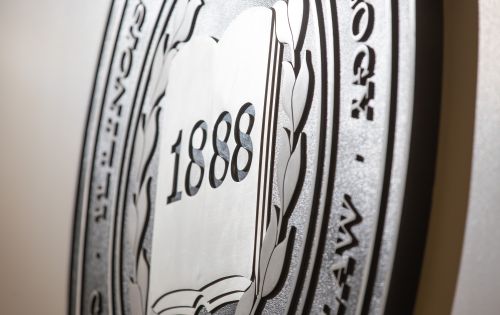
Chicago-Kent History
Timeline
1886
Several law clerks receive tutorials in Appellate Judge Joseph M. Bailey’s chambers to prepare for the newly instituted Illinois bar examination. The evening sessions evolved into formal classes and, in 1888, the establishment of Chicago College of Law, the second law school in Illinois. Judge Bailey became the school’s first dean.
1891
Emma Baumann graduates from Chicago College of Law, becoming the first woman to earn a law degree from the school.
1894
Ida Platt graduates with honors from Chicago College of Law, and soon becomes the first black woman admitted to the Illinois bar—and only the second woman of color admitted to practice law in the United States. She later helped establish the Cook County Bar Association, the nation’s oldest African-American bar association.
1895
Marshall D. Ewell founds Kent College of Law, named for Chancellor James B. Kent, author of the influential Commentaries on American Law. Ewell serves as the school’s first and only dean.
1898/1899
The first chapters of Lambda Epsilon, later Phi Alpha Delta, the world’s largest legal fraternity, begin at Chicago College of Law and Kent College of Law.
1900
Chicago College of Law merges with Kent College of Law, to form Chicago-Kent College of Law. Appellate Judge Thomas A. Moran becomes the first dean of the new school.
1903
Appellate Judge Edmund W. Burke is named Chicago-Kent College of Law’s second dean. Judge Burke’s son, Webster H. Burke, became dean following the elder Burke’s death in 1918, serving out what would become nearly 50 years of continual leadership by the Burke family.
1912
Chicago-Kent College of Law moves to rented space in the 116 North Michigan Avenue building, where it remains for the next 12 years.
1923
The Chicago Kent Review begins continuous publication under the direction of Dean Webster H. Burke. Several years later, it adopted its current name, the Chicago-Kent Law Review. The publication began as the Anthenaeum Law Bulletin, one of the nation’s first law reviews.
1924
Chicago-Kent purchases the building at 10 North Franklin Street, which serves as its home for the next 50 years.
1936
Chicago-Kent College of Law earns certification from the Section of Legal Education of the American Bar Association.
1942
The Student Bar Association, the law school’s student government, is organized and affiliated with the Illinois Law Student Association and the American Bar Association’s Law Student Division. Officers and student representatives are elected each year from the student body.
1951
Chicago-Kent College of Law becomes a member of the Association of American Law Schools.
1969
Chicago-Kent merges with Illinois Institute of Technology, becoming one of the few U.S. law schools affiliated with a technical university.
1971
Chicago-Kent establishes its rigorous trial advocacy program. Students gain practical experience in litigation techniques under the tutelage of veteran judges and practicing attorneys, who lead small trial advocacy classes and coach student teams that compete in local, regional, and national trial competitions.
1976
Chicago-Kent moves from 10 North Franklin Street to 77 South Wacker Drive, and starts the nation’s first in-house, fee-generating law school clinic in which a faculty of practicing lawyers engage students to work on real cases under the discipline of actual practice conditions. In a typical year, clinical professors and students handle hundreds of cases in employment, criminal, health, and tax law.
1978
Chicago-Kent pioneers the three-year legal research and writing program, which is now emulated at law schools across the nation. To ensure personal attention, most writing classes have fewer than 30 students. The Moot Court Honor Society is founded to provide practical skills training in the foundations of appellate advocacy: brief writing and oral argument. Chicago-Kent fields a number of moot court teams that compete at the national and international levels in a variety of subject areas.
1989
Chicago-Kent establishes a chapter of the Order of the Coif, an honorary scholastic society that encourages excellence in legal education by fostering a spirit of careful study and recognizing students, lawyers, judges, and teachers for their scholarly or professional accomplishments.
1992
Chicago-Kent opens the “law school of the future” at 565 West Adams Street in Chicago’s West Loop neighborhood, making the state-of-the-art building its new and current home. It was renamed the Conviser Law Center in 2020.
2008
Chicago-Kent wins both the National Moot Court Competition and National Trial Competition, making it the first school to win both competitions in the same year.
2019
Anita K. Krug becomes the first permanent female Dean in the law school’s history.
